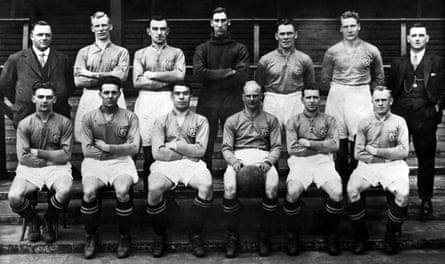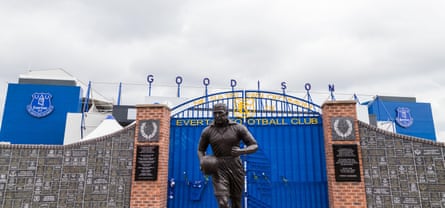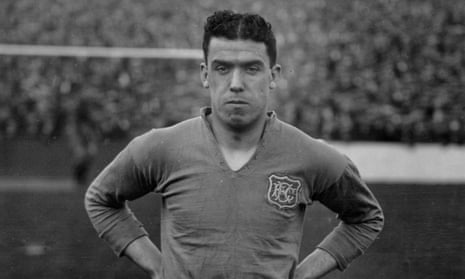Haaland has overtaken Alan Shearer and Andy Cole, but is still some way short of Dean’s tally of 60 goals in the 1927-28 season.
There is a statue on the perimeter of Goodison Park that commemorates the most prolific goalscorer England has ever produced. He scored 60 league goals in one season and, more than 40 years after his death, is still the yardstick against which all strikers are judged. That man is Dixie Dean.
William Ralph Dean was born in Birkenhead on 21 January 1906. Although the nickname “Dixie” persisted throughout his career, he detested it and anybody careless enough to address him as Dixie was reminded his name was Bill. As a kid he was known as “Digsy” due to a street game of tag, which involved digging your fist into the back of somebody you had tagged. When he started playing for the Wirral railway company’s football team as a teenager, establishing a reputation as a goalscoring prodigy, local press reports referred to him as “Dixie” rather than “Digsy” and the name stuck.
Dean signed for his first club, Tranmere, in the summer of 1923. He made his full league debut against Rotherham but Tranmere lost 5-1 and he was soon back in the stiffs.
It was here, the following month, that his league career nearly ended even before it had started.
In February 1924, Dean played against Altrincham in the Cheshire Senior Cup.
He scored two goals before his tormented marker warned him he would not score any more, delivering a carefully aimed kick between Dean’s legs.
The pain was excruciating, he lost a testicle and his career was placed in jeopardy.
Years later Dean was in a bar in Chester when someone offered to buy him a drink. Dean recognised the man as Davy Parkes, who he believed was responsible for the loss of his testicle.
As Dean told the story, he then laid his former opponent out with one punch.
Revenge was sweet. Or was it? Meticulous research by biographers revealed Dean had assaulted the wrong man.
Nonetheless, Dean became a regular for Tranmere during the 1924-25 season in the Third Division North, scoring 27 goals in as many league games, an even more impressive statistic considering that Tranmere finished second bottom. Several clubs were scouting Dean, but he only wanted to play for Everton.
On transfer deadline day – 16 March 1925 – Everton signed him for a fee of £3,000, the highest fee paid for a Third Division player or an 18-year-old. As he later recalled: “To join Everton was all that I had been waiting for.” He made his debut at Arsenal the following Saturday and scored his first ever league goal at Goodison Park, against Aston Villa, seven days later.
The start of the 1925-26 season heralded the introduction of one of the most transformative rule changes of the century, when the offside law was altered so only two players rather than three were required for someone to be onside. The previous season, 1,192 goals were scored in Division One. The next season 1,703 were scored, with Aston Villa beating Burnley 10-0 in the first game under the new regulation. Dean and other forwards benefited immeasurably – he scored 32 goals in 38 appearances.
The future looked bright, but fate had another twist in store for Dean. In June 1926, he was involved in a head-on collision while riding his new Imperial motorbike through north Wales. He fractured his skull and jaw, and lay unconscious for 36 hours. Doctors feared he might die but thankfully his life was saved.
It looked as though his football career was over but, showing astounding powers of recuperation, Dean was back playing for Everton only four months later. Metal plates had been inserted into his skull to aid his recovery but were removed once the bones had reset. Despite this, rumours persist to this day that Dean’s legendary heading ability was due to having a metal plate in his head.
Towards the end of October 1926, Everton fans witnessed Dean’s remarkable comeback as a crowd of 30,000 watched him play a reserve game at Goodison against Blackburn. He reappeared for the first team at Leeds on 24 October and scored in a 3-1 victory. Before the game, Everton were bottom of the table and, although he scored an impressive 21 goals in 27 games, they finished the season one place off the drop. Not even the most optimistic fan could have predicted what the next season would bring.
Dean started the season in sensational form, scoring 25 times in Everton’s first 14 matches, including five against Manchester United. Everton led the table for most of the campaign and, in February, Dean smashed the previous record tally of 43 goals, set by Ted Harper of Blackburn two seasons earlier, by scoring a hat-trick at Anfield.
He now aimed to break the record of 59 goals, set by George Camsell of Middlesbrough in the Second Division the previous campaign. After an unusually barren spell in March, when Dean failed to score in four matches, he needed seven goals from the last two games of the season to surpass that total. Impossible, surely.
Dean scored four at Burnley in a 5-3 victory that helped Everton to seal the title, but limped off injured. It all came down to the last home game, on 5 May 1928 against Arsenal – and the trainer, Harry Cooke, worked his magic to ensure he was fit to play. Dean was not about to let this opportunity pass.
Arsenal scored an early goal but within a minute Dean bundled the ball over the line to equalise. Next, he was brought down in the penalty area. He gathered the ball and hit what was probably his worst penalty of the season but somehow it sneaked between the goalkeeper’s legs. He had now equalled Camsell’s record but Arsenal fought back to equalise. It remained for Dean to get the decisive goal.
As the minutes ticked away, every Everton player tried to set him up for that all-important goal, with a cacophony of vociferous encouragement urging him on from the terraces. Eventually, on 82 minutes, Everton won a corner. Te winger Alex Troup aimed his delivery at the head of Dean, who towered above the Arsenal defenders and bulleted the ball powerfully into the net. The crowd rose as one to celebrate his unbelievable achievement. It was his seventh hat-trick of the season.
Every Arsenal player shook Dean by the hand to congratulate him, bar Charles Buchan who was playing his last ever game and appeared to feel his farewell had been overshadowed. Arsenal equalised later but few Evertonians cared. Dean contributed a further 22 goals in cup and representative matches, giving him a total of 82 goals for the season. He was only 22 years old.
When he eventually left Everton in 1937, he had scored 349 goals in 399 league appearances. No footballer has come close to breaking that record of 60 goals in a season – not even Haaland.




